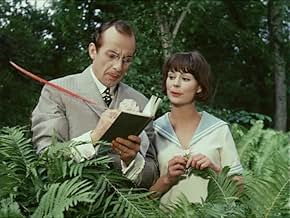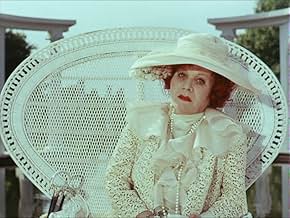IMDb RATING
5.4/10
2.7K
YOUR RATING
A critic blackmails a famous musician with his biography filled with the revelations of many of his women.A critic blackmails a famous musician with his biography filled with the revelations of many of his women.A critic blackmails a famous musician with his biography filled with the revelations of many of his women.
- Director
- Writers
- Stars
- Awards
- 1 nomination total
Jan Blomberg
- English Radio Reporter
- (uncredited)
Lars-Owe Carlberg
- Driver
- (uncredited)
Axel Düberg
- Man in Black
- (uncredited)
Doris Funcke
- Waitress
- (uncredited)
Göran Graffman
- French Radio Reporter
- (uncredited)
Yvonne Igell
- Waitress
- (uncredited)
Ulf Johansson
- Man in Black
- (uncredited)
- Director
- Writers
- All cast & crew
- Production, box office & more at IMDbPro
Featured reviews
Amazing that this film is on DVD. I saw it in 1967 (in suburban Sacramento of all places) and have never seen a trace of it since.
It is a fairly terrible movie, but it does have its place in Bergman's movies. Swedish reviewers at this point in his career were among his severest critics, and this movie was his response. It should have been deft and ironic but, as I think we're all aware by now, Bergman is not exactly over-burdened with a sense of humor. I suppose he also thought color as something of a joke at that time, which might explain some of the very ugly effects.
I can't really recommend the movie but it does give some insight into Bergman, so I rank it a little higher than the other reviewers.
P.S. And I thank Anders, the foreign exchange student from Stockholm at my high school, for making me see this movie and who filled me in on the info about Bergman and the critics. He too thought it a lousy movie.
It is a fairly terrible movie, but it does have its place in Bergman's movies. Swedish reviewers at this point in his career were among his severest critics, and this movie was his response. It should have been deft and ironic but, as I think we're all aware by now, Bergman is not exactly over-burdened with a sense of humor. I suppose he also thought color as something of a joke at that time, which might explain some of the very ugly effects.
I can't really recommend the movie but it does give some insight into Bergman, so I rank it a little higher than the other reviewers.
P.S. And I thank Anders, the foreign exchange student from Stockholm at my high school, for making me see this movie and who filled me in on the info about Bergman and the critics. He too thought it a lousy movie.
I agree that "All These Women" is misunderstood, especially if you look at it in the context of Bergman's filmography. He had just completed the "Silence of God" trilogy, one of the deepest, most serious works in the history of cinema. So, cut the man some slack and allow him his lark, his goof, his chance to riff on fans and critics and the illusion of the exalted artist (himself), before returning to his true work with his next film, the universally praised "Persona."
I also think he was a little influenced by "8 1/2" which had come out the year before, appreciating Fellini's playfulness as well as his insight into the creative process and, of course, "all these women." Bergman will always be thought of as a somewhat austere and oft despairing artist, but thankfully we have several films that belie that, like "Smiles of a Summer Night," "The Magician," and this little oddball gem.
I also think he was a little influenced by "8 1/2" which had come out the year before, appreciating Fellini's playfulness as well as his insight into the creative process and, of course, "all these women." Bergman will always be thought of as a somewhat austere and oft despairing artist, but thankfully we have several films that belie that, like "Smiles of a Summer Night," "The Magician," and this little oddball gem.
Comedy without laughs? Certainly. Anyone looking for clever retorts and hilarious situations will be frankly disappointed. Actually, comedy here is nothing more than a style adopted by Bergman for his usual speech. It is the tone that interests him, the tone of farce, of slapstick.
Also Bergman's taste for the theater, for the comedians who appear so many times in his films, for the professionals who repeat the learned and inherited routines, knowing that an actor who knows his job can always make them fun again.
And Bergman when it comes to comedians has the best, not only extraordinary actors but disciplined workers capable of adapting to what the director asks of them at all times. And they indulge in the tired comic routines with absolute conviction and immeasurable talent: above all Jarl Kulle as Cornelius, the critic who goes to visit the master in his summer villa to write the biography of the musician; and of course, the cast of great actresses: Gertrude Frigh (the great theater actress who would be her Hedda Gabler on stage, in addition to appearing in important roles in several of her most famous films), Bibi Andersson (one of the great actresses in Bergman's work), or the wonderful Eva Dahlbeck (even more beautiful than in Smiles) and Harriet Andersson.
The scenes are often amazingly choreographed, with a markedly theatrical nature, and one cannot help but think about the repetitions, the hours of rehearsals necessary for the gear to work with that perfection and that rapport between the actors and the director.
Visually it is a highly sophisticated work, with wonderful color photography by Sven Nykvist and spectacular production design by another regular from the director, P. A. Lundgren, who creates a kind of Hadrian's Villa spiced up with decorations between Rococo and Neo-Gothic, where each room is like a stage of marble and stucco barely occupied by the minimum props required by the scene and white Roman sculptures.
The work is funny, extremely agile, consciously ridiculous, the problem is that Bergman's speech is not as rich as in other works of his (as an advantage it must be said that he does not fall into the pedantry that ruins so many scenes of his work) and no real depth. It is an assumedly minor work, a harmless game about the relationships and mutual dependence of the critic and the artist, about the exposure of the artist in his work and the public's desire to investigate the life and mind of the artist, about the need that artists have for critics who explain them and by studying them places the artists in history. The critic is a vain, selfish, indiscreet, amoral being, but he is at the same time humiliated, used, deceived, ignored. The artist is a mysterious figure, distant, somewhat repulsive from the outside, and elusive, who speaks only through his art.
The direction, as always, is masterful. The work moves away from the gloomy and expressionist style of his previous films (the famous trilogy) and shows that Bergman was looking for new directions, new cinematographic resources. His next films are his two great masterpieces: Persona and The Hour of the Wolf.
Those Women is a far cry from Bergman's great works, but it is by no means the worst of his films. Taking it on its own terms, it's a risky step taken by a director who wanted to present his discourse in a totally new way, with a radically different aesthetic and approach than the one that had so much critical acclaim. The problem is that the movie doesn't tell us too much either. For some it may be the extreme case of the emptiness of content in the background of so many Bergman films, I personally agree that the ultimate value of the director is more often in his expressive abilities in the medium than in the content of his sometimes pedantic and anguished scripts.
Also Bergman's taste for the theater, for the comedians who appear so many times in his films, for the professionals who repeat the learned and inherited routines, knowing that an actor who knows his job can always make them fun again.
And Bergman when it comes to comedians has the best, not only extraordinary actors but disciplined workers capable of adapting to what the director asks of them at all times. And they indulge in the tired comic routines with absolute conviction and immeasurable talent: above all Jarl Kulle as Cornelius, the critic who goes to visit the master in his summer villa to write the biography of the musician; and of course, the cast of great actresses: Gertrude Frigh (the great theater actress who would be her Hedda Gabler on stage, in addition to appearing in important roles in several of her most famous films), Bibi Andersson (one of the great actresses in Bergman's work), or the wonderful Eva Dahlbeck (even more beautiful than in Smiles) and Harriet Andersson.
The scenes are often amazingly choreographed, with a markedly theatrical nature, and one cannot help but think about the repetitions, the hours of rehearsals necessary for the gear to work with that perfection and that rapport between the actors and the director.
Visually it is a highly sophisticated work, with wonderful color photography by Sven Nykvist and spectacular production design by another regular from the director, P. A. Lundgren, who creates a kind of Hadrian's Villa spiced up with decorations between Rococo and Neo-Gothic, where each room is like a stage of marble and stucco barely occupied by the minimum props required by the scene and white Roman sculptures.
The work is funny, extremely agile, consciously ridiculous, the problem is that Bergman's speech is not as rich as in other works of his (as an advantage it must be said that he does not fall into the pedantry that ruins so many scenes of his work) and no real depth. It is an assumedly minor work, a harmless game about the relationships and mutual dependence of the critic and the artist, about the exposure of the artist in his work and the public's desire to investigate the life and mind of the artist, about the need that artists have for critics who explain them and by studying them places the artists in history. The critic is a vain, selfish, indiscreet, amoral being, but he is at the same time humiliated, used, deceived, ignored. The artist is a mysterious figure, distant, somewhat repulsive from the outside, and elusive, who speaks only through his art.
The direction, as always, is masterful. The work moves away from the gloomy and expressionist style of his previous films (the famous trilogy) and shows that Bergman was looking for new directions, new cinematographic resources. His next films are his two great masterpieces: Persona and The Hour of the Wolf.
Those Women is a far cry from Bergman's great works, but it is by no means the worst of his films. Taking it on its own terms, it's a risky step taken by a director who wanted to present his discourse in a totally new way, with a radically different aesthetic and approach than the one that had so much critical acclaim. The problem is that the movie doesn't tell us too much either. For some it may be the extreme case of the emptiness of content in the background of so many Bergman films, I personally agree that the ultimate value of the director is more often in his expressive abilities in the medium than in the content of his sometimes pedantic and anguished scripts.
It's taken a few goes, but I have finally discovered that I can dislike a Bergman film. Perhaps Swedish humour shares some characteristics with Danish humour which tends to leave me cold and perplexed.
Several years on, I still cannot get the cheesy, syncopated version of "Yes, We Have No Bananas" out of my head.
The cast try their best but the material is beyond redemption. in fact, this cast does not include the best Bergman people anyhow.
This film simply is not at all funny nor is it interesting once you get 10 minutes in.
It is merely irritating.
This film is a lemon.
Several years on, I still cannot get the cheesy, syncopated version of "Yes, We Have No Bananas" out of my head.
The cast try their best but the material is beyond redemption. in fact, this cast does not include the best Bergman people anyhow.
This film simply is not at all funny nor is it interesting once you get 10 minutes in.
It is merely irritating.
This film is a lemon.
Felix is a very happy fellow, none more so when he's fiddling with his cello, of which he has a few, perpetually in a queue, makes Cornelius a little green, although he's yellow.
It's a bit of fun, but not funny and there's little pun, plus it hasn't aged well so move on, do not dwell.
Plenty of Bergman stalwarts, including the gorgeous Bibi Andersson, the engaging Harriet Andersson and the delightful Eva Dahlbeck however, even they can't save this, as the story's as daft as a brush and it soon becomes a bit of a chore, as the end seems to extend to a point where you stop caring, and start looking for the door.
It's a bit of fun, but not funny and there's little pun, plus it hasn't aged well so move on, do not dwell.
Plenty of Bergman stalwarts, including the gorgeous Bibi Andersson, the engaging Harriet Andersson and the delightful Eva Dahlbeck however, even they can't save this, as the story's as daft as a brush and it soon becomes a bit of a chore, as the end seems to extend to a point where you stop caring, and start looking for the door.
Did you know
- TriviaThis is Ingmar Bergman's first color film.
- Crazy creditsThe disclaimer at the beginning states that: "Every similarity between this film and the so-called reality has to be a misunderstanding".
- SoundtracksOrchestral Suite No. 3 D-dur (BWV 1068)
Composed by Johann Sebastian Bach
- How long is All These Women?Powered by Alexa
Details
- Runtime
- 1h 20m(80 min)
- Sound mix
- Aspect ratio
- 1.37 : 1
Contribute to this page
Suggest an edit or add missing content
































